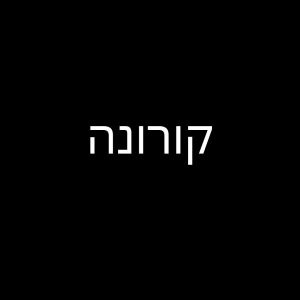This prayer was written by Pardes Liturgist-in-Residence, Alden Solovy, with the help of Pardes faculty member Rabbi Dr. Howard Markose and Pardes student Alex Griffel. The story behind the prayer follows afterward. You can find several of Alden’s prayers relating to the Covid-19 pandemic on the Pardes page Strength and Courage for Uncertain Times.
Healing from Coronavirus
|
יהי רצון מלפניך |
May it be Your will,
G-d of our fathers and mothers
That You cast the light of health and well-being
On those who’ve been exposed to coronavirus,
Those who have contracted the disease,
And those who contract the disease in the future, G-d forbid.
Bless them, protect them and bring them speedily to full recovery.
Send them
Healing of soul,
Healing of body,
And healing of spirit.
And let us say, Amen
© 2020 Alden Solovy and tobendlight.com.
From Alden Solovy about the prayer:
For the past week or so, two Pardes students and one faculty member have been collaborating on a Hebrew prayer for healing for those exposed to or sick with coronavirus.
Via email and WhatsApp, Pardes student Alex Griffel and I – with the assistance of faculty member Rabbi Howard Markose – created a prayer. Along with being a full-time student, I’m also the Liturgist-in-Residence at Pardes.
As a modern liturgist, it’s part of my mission to create new prayers for crises, calamity or national disaster. In the past two weeks, I’ve written half a dozen prayers in response to the pandemic. As you might suspect, my first such prayers.
Alex was drawn to a prayer called “Healing from Coronavirus,” but said that he needed the words in Hebrew to feel fully engaged in the prayer. I invited him to translate it. We made a few decisions to make the Hebrew version more consistent with classic tefilah (prayer). We made two major adjustments. Alex opened the translation with the second line of my prayer, “May it be Your will, G-d of our fathers and mothers….” We also made the choice to drop a chatimah (the closing phrase) that I wrote for the original English version of prayer. With that as a starting point, Alex kept the Hebrew as close to the original English as possible.
Once Alex and I finished a bit of tinkering, I sent the prayer to Howard, who teaches, among other things, Biblical Hebrew Grammar. There were a variety of technical issues with the Hebrew, with some new challenges appearing with each re-read of the text. With Howard’s guidance and challenges – and a long string of WhatsApp and email messages – we arrived at the final version prayer.

